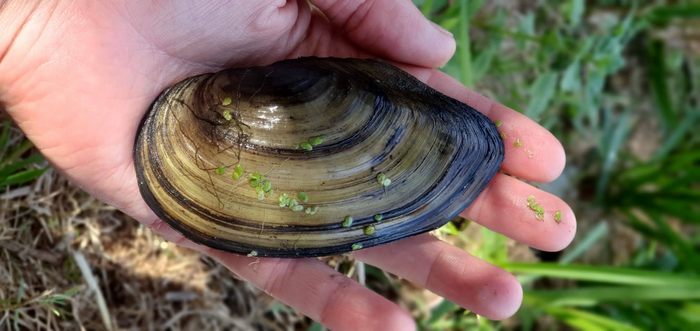Scientists replicated a 1964 River Thames survey and found that mussel numbers have declined by almost 95%, with one species – the depressed river mussel – completely gone.

Credit: University of Cambridge
Scientists replicated a 1964 River Thames survey and found that mussel numbers have declined by almost 95%, with one species – the depressed river mussel – completely gone.
The detailed study measured the change in size and number of all species of mussel in a stretch of the River Thames near Reading between 1964 and 2020.
The results were striking: not only had native populations severely declined, but the mussels that remained were much smaller for their age – reflecting slower growth.
Mussels are important in freshwater ecosystems because they filter the water and remove algae. As filter feeders they’re exposed to everything in the water, and this makes them a valuable indicator of ecosystem health. Mussel shells also provide places for other aquatic species to live.
“Mussels are a great indicator of the health of the river ecosystem. Such a massive decline in mussel biomass in the river is also likely to have a knock-on effect for other species, reducing the overall biodiversity,” said Isobel Ollard, a PhD student in the University of Cambridge’s Department of Zoology and first author of the report.
She added: “The depressed river mussel used to be quite widespread in the Thames, but this survey didn’t find a single one – which also raises concerns for the survival of this species.”
The study also recorded new arrivals: the invasive, non-native zebra mussel, Dreissena polymorpha, and Asian clam, Corbicula fluminea – both absent from the original 1964 survey – were present in high numbers. The scientists say invasive species probably hitched a ride on boats as they sailed up the Thames, and established themselves in the river.
The results are published today in the Journal of Animal Ecology.
“This dramatic decline in native mussel populations is very worrying, and we’re not sure what’s driving it,” said Professor David Aldridge in the University of Cambridge’s Department of Zoology, and senior author of the report.
He added: “While this might seem like a rather parochial little study of a single site in a single river in the UK, it actually provides an important warning signal about the world’s freshwaters.”
The invasive species could be behind the decline in the native mussel populations: zebra mussels are known to smother native species to death. But the scientists say more work is needed to be sure. Other causes could be changes in land use along the river, or changes in the fish populations that mussels depend on as part of their life cycle.
Many empty shells of the depressed river mussel, Pseudanodonta complanata, were found in the survey, indicating that the species had been living at this site in the past. The depressed river mussel is one of the most endangered mussel species in the UK.
The survey found that the population of duck mussels, Anodonta anatina, had decreased to just 1.1% of 1964 levels, and the painter’s mussel, Unio pictorum, decreased to 3.2%.
The scientists think the mussels’ reduced growth rate may reflect the river’s return to a more ‘natural’ state. Since 1964, levels of nitrate and phosphate in the river water have fallen due to tighter regulation of sewage treatment. A reduction in these nutrients would reduce the growth of algae, limiting the food available to the mussels.
Mussel species are threatened globally. The scientists say that regular population surveys of key species, like this one, are essential to tracking the health of rivers and guiding their management.
To ensure the survey was an exact replica of the original, Ollard contacted Christina Negus – who had done her survey while a researcher at the University of Reading in the sixties. Negus, who is no longer a scientist, shared details of the methods and equipment she had used. Her report, published in 1966, continues to be cited extensively as evidence of the major contribution mussels make to ecosystem functioning in rivers.
Journal
Journal of Animal Ecology
DOI
10.17863/CAM.80071
Subject of Research
Animals
Article Title
Declines in freshwater mussel density, size and productivity in the River Thames over the past half century
Article Publication Date
28-Nov-2022




